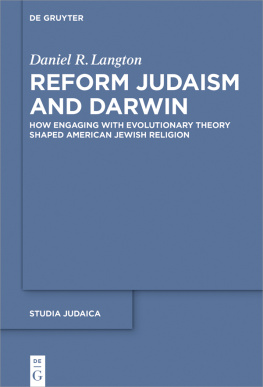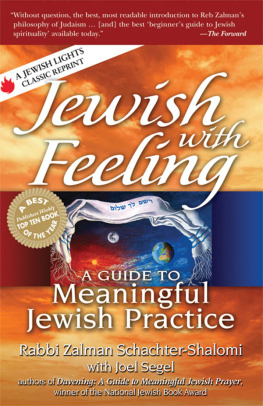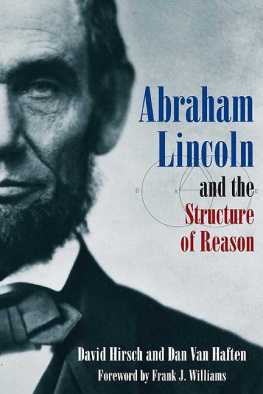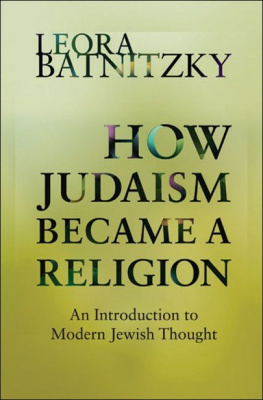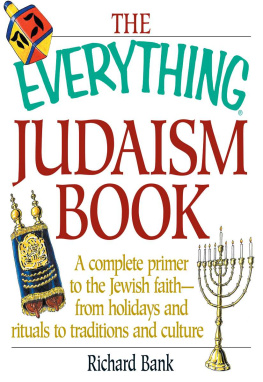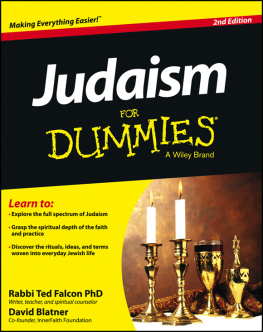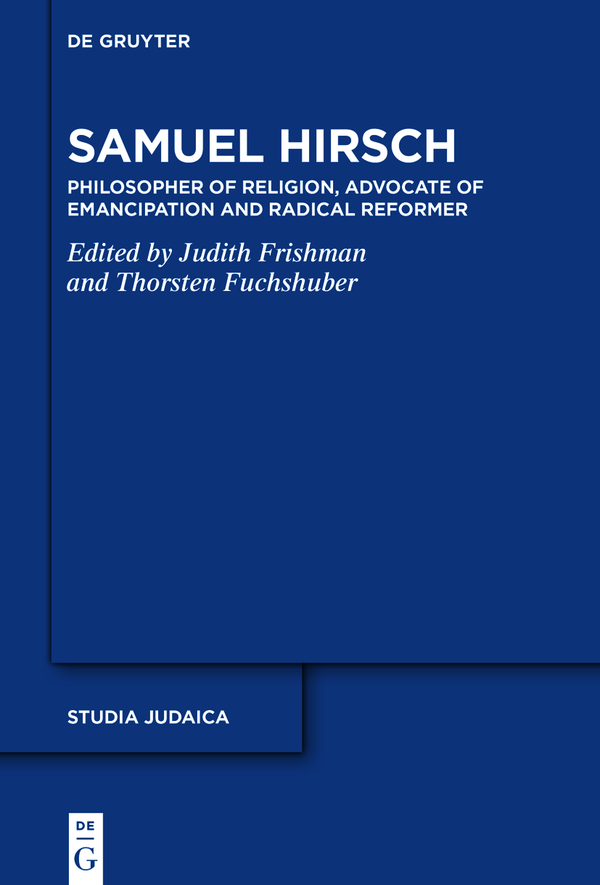Studia Judaica
Forschungen zur Wissenschaft des Judentums
Edited by
Ernst L. Ehrlich
Gnter Stemberger
Charlotte Fonrobert
Elisabeth Hollender
Alexander Samely
Irene Zwiep
Volume
ISBN 9783110464344
e-ISBN (PDF) 9783110476392
e-ISBN (EPUB) 9783110475289
Set-ISBN 9783110476408
Bibliographic information published by the Deutsche Nationalbibliothek
The Deutsche Nationalbibliothek lists this publication in the Deutsche Nationalbibliografie; detailed bibliographic data are available on the Internet at http://dnb.dnb.de.
2023 Walter de Gruyter GmbH, Berlin/Boston
Introduction and Acknowledgements
Judith Frishman
Thorsten Fuchshuber
Rabbi Samuel Hirsch (Thalfang near Trier 1815 Chicago 1889) is one of the most important Jewish Reform theologians and philosophers of religion of the first half of the 19th century. To this day, he remains one of the key figures for understanding the debates of the time on questions of Jewish emancipation, the shape of Jewish identity, the compatibility of religion with state and society, the relationship between particularism and universalism as well as the critique of antisemitism, all of which resonate in current debates. As a Jewish Hegelian, he debated with Ludwig Feuerbach, Bruno Bauer, Karl Marx and others about the legacy of Hegel's philosophy of religion. His writings are among the most authoritative of Reform Judaism; his influence on liberal Judaism in Europe and the USA is rivalled only by that of Abraham Geiger. Surprisingly, no detailed monograph or lengthy publication has yet attempted an overall presentation of the multi-layered significance of Samuel Hirsch. It is the aim of the present volume to fill this lacuna. The impetus for this publication was an international conference held at the University of Luxembourg in October 2010 as part of the research project Nation-building and Democracy: The Struggle for Participation in Luxembourg from the French Revolution to the Beginning of the Second World War (17891940) (PARTIZIP). The conference, jointly organized with the Leiden University Institute for Religious Studies, was sponsored by the Luxembourg Fonds National de la Recherche (FNR). Almost all those researching the life and work of Samuel Hirsch attended and their contributions are presented in this volume. These have been complemented by essays by other leading experts in the field by invitation of the editors. The result is a comprehensive portrayal and historical analysis of almost all the important aspects of Samuel Hirsch's multifaceted career. The title of the event, Samuel Hirsch: Philosopher of Religion, Advocate of Emancipation and Radical Reformer, has been retained for this anthology. It is the opinion of the editors that this title epitomizes the significance of Samuel Hirschs life and works and his lasting, yet often unacknowledged, influence.
En route from Thalfang via Dessau and Luxembourg to Philadelphia, Hirsch left his mark on societal, religious, and philosophical developments in manifold ways. By the time he was appointed Chief Rabbi of the Jewish community in Luxembourg in 1843, he had already written many of his most important works on the philosophy of religion. In the Grand Duchy of Luxembourg the legal and political equality of the Jews implemented in 1797 under French rule was neither revoked at the end of Napoleon's reign nor after the Congress of Vienna in 1815. In Luxembourg one of Hirschs main endeavors was advocating for the emancipation of the Jews in Europe. At the same time, he fought against Jew-hatred, which in Catholic-ultramontane dominated Luxembourg manifested itself both in the form of traditional religious anti-Judaism and in modern forms of antisemitism. As a newspaper editor Hirsch took up his pen and spiritedly intervened in debates on social equality. When, at the final stage of his career, he moved to the USA with his family in 1866 to succeed his friend David Einhorn as rabbi of the Reform congregation Keneseth Israel in Philadelphia, his reputation as a leading figure in the Jewish Reform movement had already preceded him. In the USA, where a mass immigration of German Jews in the 19th century had taken place, he also played a decisive role in shaping Reform Judaism and was thus able to reaffirm his importance as a modernizer of Judaism.
This anthology attempts to do justice to all these aspects of Samuel Hirsch's work and to place them in their specific historical context. To facilitate reading and to make Hirschs development comprehensible, we have divided the volume into several sections that occasionally (and inevitably) overlap thematically. The introductory section of the book comprises a detailed biographically oriented article. Tracing our protagonists footsteps through his three cities of residence Dessau, Luxembourg and Philadelphia Christian Wiese places Samuel Hirschs various creative phases in their respective geographical and intellectual context, exploring how his distinctive approach to modern Judaism was shaped and developed. The four years Hirsch spent in Dessau are of particular significance for the interpretation of his intellectual growth, as Wiese explains. It was during this period of his life that he developed the central themes of his sermons as well as his primary philosophical work into an overall concept of religious philosophy. Moreover, during the Dessau period he formed his argument in defense of the Jews participation in European society and culture that included the retention of a distinct, independent religious and cultural identity as a conditio sine qua non. He grounded these demands theologically in Israels universal, historical mission. As for his debates with non-Jewish intellectuals, Hirsch was particularly embroiled in a dispute with the anti-Jewish attacks of the Young Hegelian Bruno Bauer that coincided with his arrival in Luxemburg 1843. Upon his arrival in the United States in August 1866 Hirsch would become David Einhorns successor and one of the leading intellectual figures of radical Reform Judaism in the United States. While Hirsch held to the most important elements of his philosophy, Wiese notes that it is impossible to overlook the fact that the difference in conditions there contributed to a significant shift in his thinking.
The second section examines fundamental elements of Samuel Hirschs religious philosophy in the light of their societal and political implications. Focusing on Hirschs Dessau years, Gershon Greenberg argues that it was there that Hirsch established freedom as the principle of Judaism. The emancipation of Jews in Western Europe opened uncharted territory for intellectual activity, Greenberg argues. It also created a stage for new and original points of departure for systematic Jewish thought, such as the principle of freedom that undergirded Samuel Hirschs Jewish, Hegelian, religious philosophical undertaking. According to him, freedom entered history with Abraham, who instilled it in the people of Israel. Under Gods leadership, Israels history was a process of overcoming sin and realizing freedom. Drawing on Die Religionsphilosophie der Juden, Greenberg examines Hirschs concept of freedom in depth. The driving force behind the religious philosophers historiosophy was the ongoing correlation between the divine ground of freedom and the human actualization of potential freedom. This applied to the political arena as well. Even though Hirsch resented the state for not including Judaism on its own terms as an integral part of society but instead merely tolerated the Jews, he attributed the failure of emancipation primarily to Jews themselves and to Christians, as Greenberg explains. Jewish emancipation, understood in terms of the principle of freedom, was thus undermined by both Judaism and Christianity alike: they failed to foster the coalescence between the divine and human realms requisite for the state to be a vessel for a life of freedom.


